城市结构与出行特征文献汇编
《2024年城市形态、交通模式和居民出行方式研究》范文

《城市形态、交通模式和居民出行方式研究》篇一城市形态、交通模式与居民出行方式研究一、引言随着城市化进程的加速,城市形态、交通模式和居民出行方式成为了研究城市发展的重要课题。
本文旨在通过对城市形态的演变、交通模式的形成及居民出行方式的变化进行深入研究,为城市规划、交通设计和政策制定提供科学依据。
二、城市形态的演变城市形态是指城市在地理空间上的分布和结构形态。
随着社会经济的发展,城市形态也在不断演变。
首先,城市扩张和空间重组是城市形态演变的主要特征。
随着人口和产业的集聚,城市不断向外扩张,新的区域和社区逐渐形成。
同时,老旧的城市区域进行改造和重组,以提高城市的整体功能。
其次,城市形态受到地理、文化、经济等多种因素的影响。
地理因素如地形、气候等对城市的布局和建筑风格产生影响;文化因素则决定了城市的特色和风貌;经济因素则决定了城市产业的发展方向和就业结构。
三、交通模式的形成交通模式是指城市内部的交通网络和交通流量的分布。
随着城市化进程的加速,交通模式的形成也发生了显著变化。
一方面,公共交通的发展是交通模式形成的关键。
公共交通包括公交、地铁、轻轨等,其网络覆盖面广、运量大,成为城市居民出行的主要方式。
另一方面,私家车、出租车等个体交通方式也占据了重要地位。
然而,随着城市拥堵问题的日益严重,个体交通方式的弊端也逐渐显现。
此外,步行和骑行等绿色出行方式也逐渐受到重视。
随着健康理念的普及和城市环境的改善,越来越多的人选择步行或骑行出行,这有助于缓解城市交通压力,提高出行质量。
四、居民出行方式的变化随着城市形态和交通模式的变化,居民出行方式也发生了显著变化。
首先,居民出行距离和频率不断增加。
随着城市扩张和就业结构的多样化,居民的出行距离和频率都在不断增加。
同时,居民的出行目的也更加多样化,包括通勤、购物、娱乐、旅游等。
其次,居民出行方式的选择受到多种因素的影响。
除了交通模式外,政策、经济、文化等因素也会影响居民出行方式的选择。
城市交通出行特征与出行模式分析

城市交通出行特征与出行模式分析在现代城市中,交通出行一直是人们生活中不可或缺的重要组成部分。
随着城市化进程的加快,城市交通出行模式也在发生着深刻的变化。
本文将从城市交通出行的特征与出行模式两个方面进行探讨。
城市交通出行的特征在很大程度上与城市规模、人口密度、道路网络等因素相关。
首先,城市规模越大,其交通出行的特点往往越明显。
大城市往往交通繁忙,交通拥堵问题较为突出,因此出行时间也相应增加。
而小型城市由于人口密度相对较低,出行时间相对较短。
其次,人口密度也是影响城市交通出行特征的重要因素。
人口密度高的城市,由于人口聚集在相对较小的地域范围内,交通出行更加集中,因此交通拥堵问题较为严重。
反之,人口密度较低的城市由于人口分散,出行相对分散,交通问题相对较轻。
城市交通出行模式的分析主要涉及城市居民的出行方式、出行时间和出行距离等方面的内容。
首先,城市居民的出行方式多种多样,其中公共交通、私人汽车和步行是主要的三种方式。
多数大城市的交通状况拥挤,因此公共交通成为居民出行的主要选择。
公共交通包括地铁、公交车和出租车等,相对而言能够缓解交通拥堵问题。
私人汽车在交通出行中的比例也逐渐增加,但由于车辆增加导致交通拥堵问题加剧。
步行是交通出行中最为环保和健康的方式,适用于短距离出行。
其次,城市居民的出行时间也常常受到交通拥堵问题的影响。
尤其是在高峰时段,交通流量大,通勤时间较长。
因此,很多居民选择错峰出行,以减少堵车时间。
最后,城市居民的出行距离也是影响出行模式的重要因素。
近年来,由于城市化进程的加快和城市规模的扩大,许多人在城市中工作和生活的地点之间距离较远,因此长途出行的需求也越来越大。
与城市交通出行特征与出行模式相关的因素还有很多。
例如,城市的交通规划、车辆保有量、公共交通的便捷程度等都会对交通出行产生重要影响。
同时,随着信息技术的发展,共享出行模式逐渐兴起,如共享单车、网约车等,为人们的出行提供了更多选择。
我国三大城市圈主要城市居民出行特征比较分析

擎 的长 三 角 、珠 三 角 及京 津 冀 三 大城 市 圈的 交 通 问题 尤 况 见表 1 。
为 突 出 ,主 要城 市 中心 区 内交 通 拥 挤 ,各 城 市 面 临 巨大 的 交通 压 力 ,交 通 紧 张 问题 逐 渐 蔓 延 。居 民 出行 是城 市
2 人均出行次数
人均 出行 次数 指 城 市 调 查 范 围 内适 龄人 口全 日出行 居 民 出行 状况 , 算城 市居 民出行需 求总量 的重 要指标 …。 计
S ONG e g Ch n
( a g h uZ i i T a s o tt nC n utn o , t , a g h u 5 0 3 , ia Gu n z o h xn rn p r i o s l t .L d Gu n z o 0 0 Chn ) ao a C 1
t p mo ea d ti i o s me o o h c t s a d a s e k e i tr a e a i n e we n r sd n r h r ce it sa d c t r d n p t i r me c n u fb t i e , n lo s e st n e l lt sb t e e i e t i c a a trsi i i h n r o tp c n y e o o d sz , ih c u d l y af u d t n f ra lv ai gta fcp o l ms c n my a i e wh c o l n a i o l i t f r b e . n a o o e n r i Ke wo d: t ic e Av r g u y r Ci c r l ; e a e n mb ro sd n i T i u p s ; i d ; i i ec n u e y e f e i e t rp; rp p r o e Trp mo e Trp t o s m r t m
城市居民出行特征及交通需求管理对策
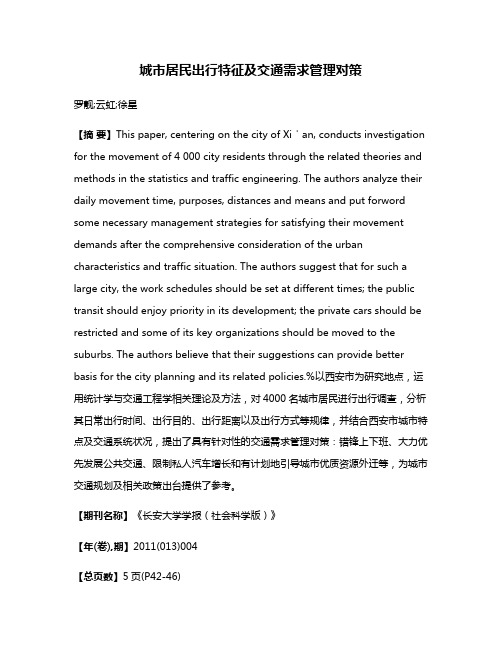
城市居民出行特征及交通需求管理对策罗靓;云虹;徐星【摘要】This paper, centering on the city of Xi'an, conducts investigation for the movement of 4 000 city residents through the related theories and methods in the statistics and traffic engineering. The authors analyze their daily movement time, purposes, distances and means and put forword some necessary management strategies for satisfying their movement demands after the comprehensive consideration of the urban characteristics and traffic situation. The authors suggest that for such a large city, the work schedules should be set at different times; the public transit should enjoy priority in its development; the private cars should be restricted and some of its key organizations should be moved to the suburbs. The authors believe that their suggestions can provide better basis for the city planning and its related policies.%以西安市为研究地点,运用统计学与交通工程学相关理论及方法,对4000名城市居民进行出行调查,分析其日常出行时间、出行目的、出行距离以及出行方式等规律,并结合西安市城市特点及交通系统状况,提出了具有针对性的交通需求管理对策:错锋上下班、大力优先发展公共交通、限制私人汽车增长和有计划地引导城市优质资源外迁等,为城市交通规划及相关政策出台提供了参考。
国内不同类型城市居民出行特征分析.

第 32卷第 3期 2008年 6月武汉理工大学学报 (交通科学与工程版Jou rnal of W uhan U n iversity of T echno logy(T ran spo rtati on Science &EngineeringV o l . 32 N o. 3June 2008国内不同类型城市居民出行特征分析收稿日期 :2008201224邹志云 :男 , 40岁 , 副教授 , 硕士生导师 , 主要研究领域为交通运输规划与管理邹志云 1, 2 蒋忠海 3 胡程 2 2(北京交通大学交通学院 1 (华中科技大学交通科学与工程学院 2 (3 528000摘要 :, 对数据进行归纳整理 , 从出行次数、出行 4个方面进行分析 . 通过对城市进行分类 , 找出不同类型城市的居 , . 对居民出行次数 , 按照人口规模分类 , 建立了不同人口规模城市的居民人均出行次数模型 , 通过建摸的方式找出不同人口规模城市的居民出行次数规律 . 关键词 :回归模型 ; 人均出行次数 ; 出行目的 ; 出行方式结构 ; 出行耗时中图法分类号 :U 491. 2+5作为城市交通规划、建设的重要依据 , 居民出行特征分析越来越得到重视 . 居民出行是指居民为完成某一目的 , 使用某一种交通方式 , 耗用一定时间 , 从出发地经某一路径到达目的地的位移过程 . 居民出行调查是指对居民一天内详细出行情况的调查 [1]. 本文通过对国内部分城市调查数据的对比分析、归纳和推理 , 按人口规模、经济规模等指标分类 , 分析国内不同类型城市居民的出行规律及变化特征 [2].1人均出行次数全部居民的出行次数之和为出行总量 . 出行总量是城市交通系统应该具备的承受能力限度的基本量度指标 , 其与城市人口规模的比值为人均出行次数 . 一般来说 , 出行次数的多少与出行目的、城市规模、城市布局、生活方式、工作方式、家庭经济状况、交通设施、通讯设施、城市环境质量等因素有关 . 为准确地掌握城市居民的出行特征 , 自 20世纪 80年代以来 , 我国许多城市开展了居民出行调查工作 . 表 1、表 2列出了部分城市居民出行次数及相关指标数据 .大多数城市的居民人均出行次数在3次(人・ d 以下 , 少数城市居民人均出行次数超过 3次 (人・ d , 如珠海、石家庄、徐州等城市 .1. 1城市规模与人均出行次数根据统计城市 (以当年数据为准的规模 , 将其分为 2大类 , 如表 3所列 . 第 I 类分为 2小类 , 其中人口超过 500万的城市 , 包括上海、广州、杭州、南京、深圳、佛山、长春 , 这类城市人口多 , 城市规模很大 , 居民出行距离远 , 相应的出行次数减少 , 这些城市的平均居民人均出行次数为 2. 129次 (人・ d ; 人口在 100万 ~500万的城市 , 包括南宁、苏州、贵阳、乌鲁木齐、福州、合肥、邯郸、汕头、常德、无锡 , 这类城市的规模较大 , 但比500万以上人口城市要小 , 居民出行次数要多 , 这些城市的平均居民人均出行次数为 2. 560次 (人・ d ; 第 II 类是人口在 100万以下的城市 , 包括丹东、瑞安、珠海、黄石、福清、安陆 , 这类城市规模较小 , 城市范围小 , 居民的出行距离不远 , 居民出行次数要多一些 , 这些城市的平均居民人均出行次数为2. 780次(人・ d . 由此可以看出 , 一般情况下 , 居民人均出行次数随城市规模的增大而减少 .1. 2同城居民人均出行次数表 1中 , 通过前后 2个调查年份的数据的对比 , 发现居民平均出行有下降的趋势 , 说明随着城市范围的扩大和中心城区与外围城市各用地组团的联系加强 , 城市出行逐步体现出大型城市的出表 1国内部分城市统计资料 (人口大于 100万的城市序号城市市辖区人口人均国内生产总值 G 万元家庭人均可支配收入 I 万元居民人均出行次数( -1统计年份1上海 13. 13003. 07301. 09301. 95001999 2广州 7. 20004. 18801. 55201. 86002003 3杭州 6. 22002. 23400. 96702. 07002000 4南京 5. 45001. 85500. 82302.44002000 5深圳 4. 05003. 93402. 02401. 59001999 6佛山 3. 44204. 04401. 48202. 45002003 7长春 3. 10001. 86300. 7912. 2003 8南宁 2. 94501. 10900. 7912001 9苏州2. 07202. 66900. 02000 10贵阳 1. 91101. . 49002001 11乌鲁木齐 1. 50. 12. 59002000 121. 0. 79402. 72002000 1. 3400. 88970. 52942. 84002000 141. 30000. 70000. 53602. 70002001 15常德 1. 13000. 81100. 79002. 27002001 16无锡 1. 09602. 22100. 69402. 58001997表 2国内部分城市统计资料 (人口小于 100万的城市序号城市市辖区人口人均国内生产总值万元家庭人均可支配收入万元居民人均出行次数-1统计年份1丹东 0. 7600. 7180. 4492. 2502000 2瑞安 0. 7171. 5001. 2303. 3202003 3珠海 0. 6943. 7921. 3633. 0401998 4黄石 0. 6401. 4660. 6612. 4502000 5福清 0. 2002. 0001. 0002. 6002003 6安陆 0. 1430. 5010. 5522. 5902002数据来源 :各城市的统计年鉴和政府网站表 3不同规模城市人均出行次数城市分类 I II 城市规模万人 >500100~500<100人均出行次数-12. 1292. 5602. 780行特征 , 出行距离增加 , 出行次数减少 .1. 3居民人均出行次数模型对国内部分城市的居民人均出行次数、人口数、人均国内生产总值、家庭人均可支配收入 (表 2 等进行统计分析 , 建立了居民人均出行次数 T [次 (人・ d ]与该城市的人口总数 P (百万、人均国内生产总值 G (万元、家庭人均可支配收入 I (万元的三元线性回归模型和三元指数回归模型 [3]. 由于不同规模的城市影响系数不一样 , 按城市的人口规模进行分类 , 对于人口超过 100万的城市和人口少于 100万的城市分别建模 .1. 3. 1人口超过 100万城市的回归模型及检验 1 线性回归模型T =3. 076-0. 046P +0. 128G -0. 860I R 2=0. 740(1 2 指数回归模型T =3. 259×0. 981P ×1. 060G ×0. 667I R 2=0. 750(2 3 模型检验将表 1中城市的人口总数 P 、人均国内生产总值 G 、家庭人均可支配收入 I 分别代入式 (1 和 (2 , 得各城市居民人均出行次数的模型模拟值如图 1所示.图 1人口超过 100万的部分城市的居民人均出行次数模型值注 :线性回归模型与指数回归模型基本重合1. 3. 2人口少于 100万城市的回归模型及检验 1 线性回归模型T =1. 705+0. 134P -0. 240G +1. 520I R 2=0. 848(3 ・ 5 55・第 3期邹志云 , 等 :国内不同类型城市居民出行特征分析2 指数回归模型T =1. 889×1. 023P×0. 923G×1. 716IR 2=0. 837(43 模型检验将表 2中城市的人口总数 P 、人均国内生产总值 G 、家庭人均可支配收入 I 分别代入式 (3 和式 (4 , 得各城市居民人均出行次数的模型模拟值如图 2所示.图万的部分城市的居民人均出行次数模型值注 :线性回归模型与指数回归模型基本重合由以上 2类城市的人均居民出行次数模型可以看出 , 人口规模越大 , 居民出行次数越少 , 主要是因为城市规模越大 , 居民出行距离越长 , 相应的出行次数要减少 . 但人均国内生产总值、家庭可支配收入在这 2类城市中的影响程度不同 .2出行目的出行目的一般可分为上班、上学、购物、文化娱乐、回家、其他 , 出行目的与居民的年龄、职业相关 , 不同的年龄和职业的居民对某种出行需求的强度是不同的 . 图 3为不同城市规模城市各种出行目的比例构成图.图 3不同城市规模城市各种出行目的比例构成图由图 3可见 , 除回家外 , 上班占的比例最大 ,一般在 20%以上 , 这是城市居民出行的共同特征 , 而对于上海、杭州、珠海、广州等发达的特大城市来说 , 外出购物的比例比上学的比例要大 , 这是因为这些城市的人均国内生产总值和家庭可支配收入高 , 居民的收入高 , 因此购物的比例较大 . 对于南宁、贵阳、徐州、福清等城市来说 , 上学的比例要大一些 .3出行方式结构出行方式结构 , 一般指城市居民日常出行采用各种交通工具的人数比例集合 , 是反映城市交通发展水平的一个重要指标 . 居民出行方式一般可分为公交、自行车、步行、出租车、单位 . . 出行方式、城市形 , 与城市规模的相关性不是很明显 [4].在统计的城市中 , 步行出行和自行车出行的比例占最大 , 二者之和超过 50%, 步行的比例要大些 , 这是中国城市居民出行的一般特性 , 也符合居民出行的一般规律 .在统计的城市中 , 公交出行可按比例分 3类 , 第一类出行比例在 20%以上 , 包括贵阳、黄石、长春、杭州、南京等城市 . 南京、杭州人口超过 500万 , 平均出行距离较长 , 促使较多的居民选择公交方式 , 而黄石的人口不过百万 , 公交出行比例却超过 20%, 贵州、长春一个在南方 , 一个在北方 , 公交出行比例也较高 , 这反映了我国城市公交系统可能吸引的客源水平 . 第二类出行比例在 10%~20%之间 , 包括上海、广州、常德、深圳等城市 . 除常德外 , 其他 3个城市的人口都在 500万以上 , 这些城市的公交系统的建设水平和服务水平相对较好 , 而出行比例反而不高 , 说明随着经济的发展 , 单位车和私家车的增加 , 有相当部分转移到这类出行方式上 . 第三类出行比例低于 10%, 包括南宁、石家庄、苏州、徐州、福州、邯郸、无锡、珠海、福清等城市 . 反映了这些城市长期以来不重视公交系统的建设和管理 , 使公交服务处于严重萎缩的境地 . 总的来说 , 我国城市公交出行比例不高 , 与城市客运交通需求不相适应 , 同时也与我国公交发展战略不一致 .可以看出 , 南宁、珠海、无锡、福清、深圳、广州的摩托车出行比例很高 , 在 10%以上 , 而南宁的摩托车出行比例高达 30%以上 .4出行耗时出行耗时随居民的年龄、职业以及出行方式、・655・武汉理工大学学报 (交通科学与工程版 2008年第 32卷出行目的而不同 , 出行耗时是由城市经济发展水平、城市布局和交通环境所决定的 . 交通方式的自身特性 , 如直达性、灵活性、速度及路径等 , 直接决定了出行耗时大小 . 由于居民的出行都是带着一定目的的出行 , 所以出行目的不同 , 出行耗时也随着不同 . 从统计的数据来看 , 城市规模的大小与居民出行耗时的多少有一定的相关性 , 城市规模越大 , 分目的 (出行方式的居民出行耗时越小 . 如图 4和图 5所示 , 图 4为分目的的居民出行耗时分析图 , 图 5为分出行方式的居民出行耗时分析图 .图 4分目的的居民出行耗时分析图图 5分出行方式的居民出行耗时分析图由上图可知 , 广州、长春、南宁、苏州、徐州、福州等人口超过百万的特大城市 , 居民在公交出行上的耗时都在 35m in 以上 , 一方面说明城市规模越大 , 居民在公交出行的耗时就越多 , 而长春、南宁的公交出行耗时却比苏州、徐州要少 , 则从另一方面说明居民在公交出行上的耗时与该城市的公交运营质量密切相关 . 居民在自行车和步行出行上的耗时基本上没有太大的差异 , 除了常德市的居民的自行车出行上耗时在 40以上外 , 其他 20m in . , 自行车和 , 因此 .此外 , 以上班为目的的居民出行耗时比其他出行目的下的出行耗时要多 , 以上学为目的的居民出行耗时最少 , 其他出行目的的居民出行耗时差别不大 , 这是由于上班的出行距离较远 , 上学的距离较近决定的 .参考文献[1]王炜 , 徐吉谦 , 杨涛 , 等 . 城市交通规划理论及其应用 [M ]. 南京 :东南大学出版社 , 1998.[2]邓毛颖 , 谢理 . 广州市居民出行特征分析及交通发展的对策 [J ]. 城市规划 , 2000, 24(11 :45249.[3]吕晓夫 , 杨亚东 . 回归分析方法在船舶交通事故预测中的应用 [J ]. 武汉理工大学学报 :交通科学与工程版 , 2006, 30(3 :5462548.[4]潘艳荣 , 邓卫 . 不同交通方式服务可靠度与客流量间的灵敏度分析 [J ]. 武汉理工大学学报 :交通科学与工程版 , 2007,31(5 :7682771.A nalysis on R esiden t T ri p Characteristicsin Part of Ch inese C itiesZou Zh iyun1, 2J i ang Zhongha i 3 Hu Chen 2 M e i Yanan2(S chool of T raf f ic and T ransp orta tion , B eij ing J iaotong U n iversity , B eij ing 100044 1(S chool of T raf f ic S ci . &E ng . , H U S T , W uhan 430074 2(F oshan U n iversity , F ushan 528000 3AbstractA cco rding to su rveying data of residen t tri p s in part of Ch inese cities , characteristics of the num ber of tri p s , tri p pu rpo se , tri p structu re and tri p ti m e are analyzed . C ities are divided in to several types , and differences in residen t tri p characteristics are draw n , the reason of w h ich is also given . In p articu lar , acco rding to popu lati on scale , average num ber of residen t tri p m odel fo r differen t cities is bu ilt . In additi on , the residen t tri p ru les are draw n by m odeling . Key words :tri p p u rpo se ; structu re of tri p m ode ; tri p ti m e・755・第 3期邹志云 , 等 :国内不同类型城市居民出行特征分析。
《2024年城市形态、交通模式和居民出行方式研究》范文

《城市形态、交通模式和居民出行方式研究》篇一城市形态、交通模式与居民出行方式研究一、引言随着城市化进程的加速,城市形态、交通模式以及居民出行方式均发生了显著变化。
本文旨在通过对城市形态与交通模式的综合分析,研究居民出行方式的变化及其对城市发展的影响。
本研究对于提升城市交通效率、优化城市规划以及满足居民出行需求具有重要意义。
二、城市形态研究城市形态是指城市在地理空间上的布局和结构。
随着城市化的推进,城市形态呈现出多元化的发展趋势。
城市中心区通常为商业、文化、行政等核心功能的聚集地,而郊区则以居住、休闲等功能为主。
此外,随着新型城镇化的发展,城市形态也在不断调整和优化。
在研究城市形态时,需考虑地理环境、气候条件、历史文化等多方面因素。
例如,沿海城市的形态往往受到海洋资源的影响,而历史悠久的城市则保留了丰富的文化遗产和建筑风格。
这些因素共同影响着城市的整体布局和空间结构。
三、交通模式研究交通模式是指城市内部的交通组织和运营方式。
随着科技的发展,现代城市的交通模式已由传统的公共交通为主转变为多元化的交通模式。
这包括地铁、公交、出租车、共享单车、网约车等多种出行方式。
在交通模式的研究中,需关注交通设施的布局、交通流量的变化以及交通拥堵等问题。
例如,地铁网络的完善可以有效地缓解城市交通压力,提高出行效率;而智能交通系统的应用则可以实现交通流量的实时监控和调度,优化交通组织。
四、居民出行方式研究居民出行方式是指居民在城市内部进行日常活动所采用的出行方式。
随着城市交通模式的多元化发展,居民的出行方式也呈现出多样化的特点。
除了传统的公共交通工具外,共享单车、网约车等新型出行方式逐渐受到居民的青睐。
在研究居民出行方式时,需关注不同群体的出行需求和习惯。
例如,年轻人可能更倾向于使用网约车等便捷的出行方式,而中老年人则更依赖于公共交通工具。
此外,还需考虑出行距离、时间、成本等因素对居民出行方式选择的影响。
五、综合分析与结论综合上述分析,城市形态、交通模式与居民出行方式之间存在着密切的相互关系。
《2024年城市形态、交通模式和居民出行方式研究》范文
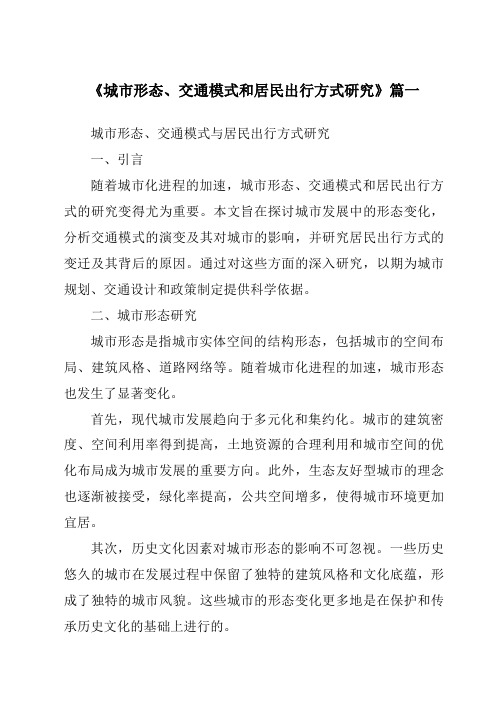
《城市形态、交通模式和居民出行方式研究》篇一城市形态、交通模式与居民出行方式研究一、引言随着城市化进程的加速,城市形态、交通模式和居民出行方式的研究变得尤为重要。
本文旨在探讨城市发展中的形态变化,分析交通模式的演变及其对城市的影响,并研究居民出行方式的变迁及其背后的原因。
通过对这些方面的深入研究,以期为城市规划、交通设计和政策制定提供科学依据。
二、城市形态研究城市形态是指城市实体空间的结构形态,包括城市的空间布局、建筑风格、道路网络等。
随着城市化进程的加速,城市形态也发生了显著变化。
首先,现代城市发展趋向于多元化和集约化。
城市的建筑密度、空间利用率得到提高,土地资源的合理利用和城市空间的优化布局成为城市发展的重要方向。
此外,生态友好型城市的理念也逐渐被接受,绿化率提高,公共空间增多,使得城市环境更加宜居。
其次,历史文化因素对城市形态的影响不可忽视。
一些历史悠久的城市在发展过程中保留了独特的建筑风格和文化底蕴,形成了独特的城市风貌。
这些城市的形态变化更多地是在保护和传承历史文化的基础上进行的。
三、交通模式研究交通模式是指城市内部的交通组织和运行方式。
随着城市化进程的推进,交通模式的演变对城市发展产生了深远影响。
一方面,公共交通的发展是交通模式演变的重要标志。
地铁、轻轨、公交等公共交通工具的发展和优化,极大地缓解了城市交通拥堵问题,提高了出行效率。
另一方面,共享出行等新型交通模式也逐渐兴起,为市民提供了更多样化的出行选择。
此外,智能交通系统的应用也对交通模式产生了重要影响。
通过智能化技术手段,实现了对交通流量的实时监测和调度,提高了交通运行效率,减少了交通拥堵和交通事故的发生。
四、居民出行方式研究居民出行方式是指居民在日常生活中采用的出行方式。
随着城市化进程的推进和交通模式的演变,居民出行方式也发生了显著变化。
首先,私家车出行依然占据一定比例。
然而,随着城市交通拥堵和环境污染问题的日益严重,越来越多的居民开始寻求其他出行方式。
城市空间结构对居民出行模式的影响研究

城市空间结构对居民出行模式的影响研究随着城市化进程的不断发展,城市空间结构对居民出行模式产生了深远的影响。
城市的空间布局、交通网络、人口分布等因素,都会对居民的出行方式、出行距离以及出行时间产生直接或间接的影响。
因此,研究城市空间结构对居民出行模式的影响,对城市规划和交通管理具有重要意义。
首先,城市的空间布局会对居民出行模式产生影响。
城市中心区域的商业、办公、文化、娱乐等功能集聚,吸引了更多的人群到中心区域工作、购物、娱乐等。
这就导致了居民在出行时往往选择公共交通工具或步行,以节省时间和成本,减少交通拥堵问题。
而距离中心区域较远的郊区或新兴城市区域,由于功能分散和交通便利性较低,居民更倾向于使用私人汽车或摩托车等自驾出行方式。
因此,城市空间布局的不同会形成不同的出行模式,直接影响着居民的出行选择。
其次,交通网络的布局对居民出行模式产生影响。
城市的交通网络的完善程度和质量会影响到居民的出行便利性。
如果交通网络分布广泛、连通性良好,居民就更容易选择公共交通工具出行,以及步行或骑行等低碳出行方式。
而如果交通网络建设滞后、交通设施不足,居民则更可能依赖私人汽车等高污染、高能耗的出行方式。
因此,合理规划城市的交通网络布局,提高公共交通的覆盖率和质量,是有效影响居民出行模式的重要手段。
此外,人口分布对居民出行模式也产生影响。
大部分城市都存在着不同的人口密度分布现象。
在人口密度较高的区域,人群聚集度高,出行距离短,居民更倾向于选择步行、骑行或者乘坐公共交通工具出行。
而在人口密度较低的郊区或者新兴城市区域,由于人口分散和低密度,交通需求量相对较大,居民更倾向于自驾出行,导致交通拥堵问题更为突出。
因此,通过合理规划和引导人口分布,可以减少交通拥堵,提高居民出行的便利性和舒适度。
此外,城市空间结构还会对居民出行距离和出行时间产生影响。
在紧凑的城市空间结构下,各种功能区域之间的距离较近,出行时间相对较短。
居民在邻近的区域内就能满足生活和工作的需求,从而减少了出行距离和时间成本。
《2024年城市形态、交通模式和居民出行方式研究》范文

《城市形态、交通模式和居民出行方式研究》篇一城市形态、交通模式与居民出行方式研究一、引言城市形态与交通模式之间存在着千丝万缕的联系,它们共同塑造了居民的日常生活与出行方式。
本文旨在深入探讨城市的空间布局、交通系统以及居民出行习惯之间的关系,分析其发展趋势和存在的问题,并探讨未来优化策略。
二、城市形态及其特征城市形态指的是城市的总体空间结构及外在表现形式,其核心组成部分包括城市的规模、形态和布局等。
城市的规模往往与人口密度和资源分配相关;城市的形态往往决定于自然环境及人类历史活动等因素,呈现多样的布局和空间组织方式。
在现代,由于技术的革新与经济的发展,许多城市在不断扩大其规模和影响范围,形成具有自身特色的城市景观。
三、交通模式的演变交通模式随着城市的发展而不断演变。
传统城市往往依赖于步行和马车等传统交通方式,而现代城市则出现了多种交通模式共存的现象。
随着公共交通的发达和私家车的大众化,交通系统愈发多样化,地铁、公交、共享单车等多样化的出行方式已经渗透到城市居民的日常生活中。
这些变革对城市的布局、规划和人们的生活品质都产生了深远影响。
四、居民出行方式的多样性现代城市的居民在出行时选择丰富多样,除了传统的步行和公共交通外,还包括私家车、共享单车、电动车、出租车等出行方式。
不同的出行方式不仅代表了居民的经济实力和出行需求,还反映了城市的交通基础设施及服务质量。
对于高密度居住区或繁忙的商业区,人们更倾向于选择便捷的公共交通工具;而对于那些距离较远或者居住在非城市中心的地区的人们来说,私家车和共享单车成为更加便利的出行方式。
五、问题分析然而,现代城市的交通状况仍然面临一系列挑战和问题。
一方面,由于城市拥堵、交通流量过大导致的拥堵现象屡见不鲜;另一方面,一些偏远地区或新兴区域的基础设施尚待完善。
同时,人们也普遍认识到单一依赖私家车带来的环境污染和资源浪费问题。
此外,交通工具的使用方式还对城市的社区布局和社会互动模式产生了深远影响。
《城市居民出行行为研究国内外文献综述3100字》
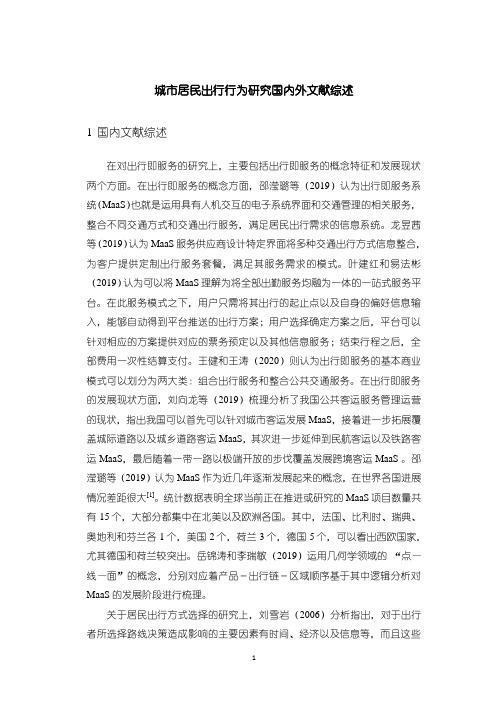
城市居民出行行为研究国内外文献综述1 国内文献综述在对出行即服务的研究上,主要包括出行即服务的概念特征和发展现状两个方面。
在出行即服务的概念方面,邵滢璐等(2019)认为出行即服务系统(MaaS)也就是运用具有人机交互的电子系统界面和交通管理的相关服务,整合不同交通方式和交通出行服务,满足居民出行需求的信息系统。
龙昱茜等(2019)认为MaaS服务供应商设计特定界面将多种交通出行方式信息整合,为客户提供定制出行服务套餐,满足其服务需求的模式。
叶建红和易法彬(2019)认为可以将MaaS理解为将全部出勤服务均融为一体的一站式服务平台。
在此服务模式之下,用户只需将其出行的起止点以及自身的偏好信息输入,能够自动得到平台推送的出行方案;用户选择确定方案之后,平台可以针对相应的方案提供对应的票务预定以及其他信息服务;结束行程之后,全部费用一次性结算支付。
王健和王涛(2020)则认为出行即服务的基本商业模式可以划分为两大类:组合出行服务和整合公共交通服务。
在出行即服务的发展现状方面,刘向龙等(2019)梳理分析了我国公共客运服务管理运营的现状,指出我国可以首先可以针对城市客运发展MaaS,接着进一步拓展覆盖城际道路以及城乡道路客运MaaS,其次进一步延伸到民航客运以及铁路客运MaaS,最后随着一带一路以极端开放的步伐覆盖发展跨境客运MaaS。
邵滢璐等(2019)认为MaaS作为近几年逐渐发展起来的概念,在世界各国进展情况差距很大[1]。
统计数据表明全球当前正在推进或研究的MaaS项目数量共有15个,大部分都集中在北美以及欧洲各国。
其中,法国、比利时、瑞典、奥地利和芬兰各1个,美国2个,荷兰3个,德国5个,可以看出西欧国家,尤其德国和荷兰较突出。
岳锦涛和李瑞敏(2019)运用几何学领域的“点—线—面”的概念,分别对应着产品-出行链-区域顺序基于其中逻辑分析对MaaS的发展阶段进行梳理。
关于居民出行方式选择的研究上,刘雪岩(2006)分析指出,对于出行者所选择路线决策造成影响的主要因素有时间、经济以及信息等,而且这些因素之间就有一定的内在联系。
《2024年城市形态、交通模式和居民出行方式研究》范文

《城市形态、交通模式和居民出行方式研究》篇一城市形态、交通模式与居民出行方式研究一、引言城市,作为人类文明进步的象征,其形态与交通模式的形成对居民的生活品质产生着深远影响。
本研究通过多维度考察城市的物理形态、空间结构及其与交通模式之间的关联,进一步探讨了居民出行方式的变化与需求。
本文旨在解析当前城市形态和交通模式对居民生活的影响,并为城市规划和发展提供参考。
二、城市形态概述城市形态是城市空间结构的物理表现,包括城市的布局、建筑风格、道路网络等多个方面。
城市形态的演化往往伴随着人口增长、经济变革和技术进步等复杂因素的推动。
城市中心区多表现为高密度的建筑和复杂的交通网络,而郊区则更多表现为低密度居住区和相对便捷的交通网络。
三、交通模式分析(一)交通模式的概念与分类交通模式指的是城市中人们出行的交通方式和组织形式。
根据不同的城市形态和居民需求,交通模式可分为公共交通模式、私人交通模式等。
公共交通模式以公共交通工具如公交、地铁等为主,而私人交通模式则以私家车、摩托车等个人交通工具为主。
(二)城市形态与交通模式的关联城市形态对交通模式的形成具有重要影响。
例如,在分散式、低密度的城市形态中,私家车等私人交通工具更为普遍;而在高密度、集中式的城市中,公共交通系统更为发达,居民更倾向于使用公共交通工具。
四、居民出行方式研究(一)居民出行需求分析随着城市化进程的加速,居民的出行需求日益多元化。
除了日常通勤和购物需求外,旅游、休闲等也成为重要的出行需求。
此外,随着生活水平的提高,居民对出行质量和舒适度的要求也在不断提高。
(二)居民出行方式选择的影响因素居民的出行方式选择受到多种因素的影响,包括城市形态、交通模式、个人经济条件、个人喜好等。
在公共交通发达的城市中,居民更倾向于选择公共交通工具;而在私家车普及的地区,居民则更可能选择驾驶私家车出行。
(三)未来趋势与展望随着技术的发展和社会的进步,未来的出行方式将更加多样化和便捷化。
《2024年城市形态、交通模式和居民出行方式研究》范文
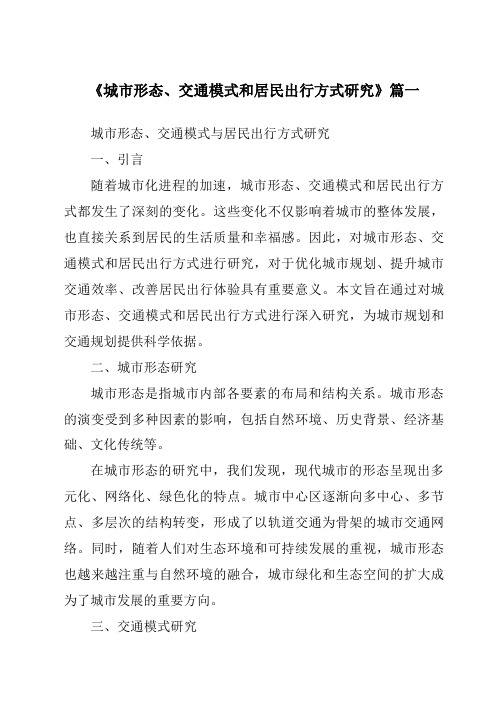
《城市形态、交通模式和居民出行方式研究》篇一城市形态、交通模式与居民出行方式研究一、引言随着城市化进程的加速,城市形态、交通模式和居民出行方式都发生了深刻的变化。
这些变化不仅影响着城市的整体发展,也直接关系到居民的生活质量和幸福感。
因此,对城市形态、交通模式和居民出行方式进行研究,对于优化城市规划、提升城市交通效率、改善居民出行体验具有重要意义。
本文旨在通过对城市形态、交通模式和居民出行方式进行深入研究,为城市规划和交通规划提供科学依据。
二、城市形态研究城市形态是指城市内部各要素的布局和结构关系。
城市形态的演变受到多种因素的影响,包括自然环境、历史背景、经济基础、文化传统等。
在城市形态的研究中,我们发现,现代城市的形态呈现出多元化、网络化、绿色化的特点。
城市中心区逐渐向多中心、多节点、多层次的结构转变,形成了以轨道交通为骨架的城市交通网络。
同时,随着人们对生态环境和可持续发展的重视,城市形态也越来越注重与自然环境的融合,城市绿化和生态空间的扩大成为了城市发展的重要方向。
三、交通模式研究交通模式是指城市内部的交通组织方式和运输系统。
随着城市化进程的加速,城市交通模式也发生了深刻的变化。
现代城市的交通模式呈现出多元化的特点,包括公共交通、私家车、步行、骑行等多种出行方式。
其中,公共交通作为城市交通的重要组成部分,承担着大量的客运任务。
随着科技的发展,公共交通也在逐步实现智能化和绿色化,如智能公交系统的应用和新能源车辆的普及等。
此外,随着共享经济的兴起,共享单车、共享汽车等新型交通方式也逐渐成为城市交通的重要组成部分。
四、居民出行方式研究居民出行方式是指居民在城市内部进行日常活动所采用的交通方式。
居民出行方式的选择受到多种因素的影响,包括出行距离、出行时间、个人喜好、经济成本等。
在现代城市中,居民出行方式呈现出多样化的特点。
除了传统的私家车出行外,越来越多的居民选择公共交通、步行、骑行等绿色出行方式。
《2024年城市形态、交通模式和居民出行方式研究》范文

《城市形态、交通模式和居民出行方式研究》篇一城市形态、交通模式与居民出行方式研究一、引言随着城市化进程的加快,城市形态、交通模式以及居民出行方式都发生了显著的变化。
这些变化不仅关系到城市的可持续发展,也直接影响着居民的生活质量和幸福感。
因此,对城市形态、交通模式及居民出行方式进行研究,具有重要的现实意义。
二、城市形态研究城市形态是指城市在地理空间上的分布和结构。
现代城市的形态受多种因素影响,包括自然环境、历史文化、经济发展等。
1. 自然环境对城市形态的影响:自然环境如山地、河流、湖泊等对城市形态的塑造起到决定性作用。
例如,沿江而建的城市往往形成带状的城市形态。
2. 历史文化对城市形态的影响:历史文化的积淀也会影响城市的形态。
例如,一些历史悠久的城市保留了大量的古建筑和历史街区,形成了独特的城市风貌。
3. 经济发展对城市形态的影响:随着经济的发展,城市的产业结构、功能分区等都会发生变化,进而影响城市的形态。
例如,经济发达地区的城市往往呈现出多中心、网络化的形态。
三、交通模式研究交通模式是指城市内部的交通组织和运行方式。
随着城市的发展,交通模式也在不断演变。
1. 传统交通模式:以公共交通为主导,包括公交、地铁等。
这种模式下,交通流量相对稳定,但易受天气、道路状况等因素影响。
2. 现代交通模式:以智能交通系统为支撑,包括共享单车、网约车、自动驾驶等新兴交通方式。
这种模式下,交通流量更加灵活,但也需要解决一系列新的挑战,如交通安全、交通拥堵等。
四、居民出行方式研究居民出行方式是指居民在日常生活中采用的出行方式。
随着城市的发展和交通模式的演变,居民的出行方式也在发生变化。
1. 公共交通出行:公共交通仍然是大多数居民的主要出行方式。
为了提高公共交通的吸引力,需要提高公共交通的准点率、舒适度和便捷性。
2. 共享出行:共享单车、共享汽车等共享出行方式受到越来越多居民的青睐。
这种出行方式既环保又经济,有助于缓解城市交通压力。
都市空间结构与居民出行行为

都市空间结构与居民出行行为随着城市化进程的加速,都市空间结构对居民的出行行为产生了深远影响。
城市的发展带来了规模化的居住区、商业中心和工业区,这些不同功能区的空间布局构成了都市空间结构。
而居民根据各自的日常生活需求,在这个都市空间中进行着出行活动。
本文将探讨都市空间结构对居民出行行为的影响。
首先,都市空间结构的紧凑程度对居民的出行方式有着明显的影响。
如果城市密度高,居住区、商业区、办公区之间的距离相对较短,居民更有可能选择步行或骑行作为出行方式。
这种情况下,居民的出行成本较低,同时也有利于促进环保和身体健康。
相反,如果城市空间分散布局,各个功能区之间距离较远,居民更倾向于使用私家车或公共交通工具进行出行。
这不仅增加了交通拥堵和环境污染的问题,还使得居民在出行时需承担更多的时间和经济成本。
其次,都市空间结构还影响了居民的社交活动和人际交往。
在紧凑的都市空间中,居民更容易接触到各种社交场所,如公园、咖啡馆、商场等,人们可以更便利地与朋友、家人或其他社区成员进行交流和互动。
这种社交活动也会促使居民增加出行的频率。
而在分散的都市空间中,社交活动相对较少,人们容易陷入社交孤立,出行行为则以满足基本需求为主。
此外,都市空间结构对居民的出行模式也有一定影响。
如果城市规模较大,各功能区之间的距离较远,居民更倾向于使用公共交通工具,如地铁、公交车等。
这种出行模式一方面可以解决交通瓶颈问题,缓解交通拥堵;另一方面也节约了居民的出行成本,提高了出行效率。
相反,如果城市规模较小,功能区之间距离相对较短,居民则更容易选择步行、骑行或者使用私家车作为出行方式。
此外,都市空间结构也影响了居民的出行距离和出行时间。
在紧凑的都市空间中,由于居住区、商业区和办公区距离相对较近,居民的出行距离会相对较短,从而减少了出行时间。
这种情况下,居民更愿意选择步行或骑行,并且更容易参与到城市的日常生活中去。
相反,在分散的都市空间中,居民的出行距离相对较远,需要更长的时间和成本,因此更容易选择使用汽车或公共交通工具。
城市空间结构与居民出行行为的耦合分析
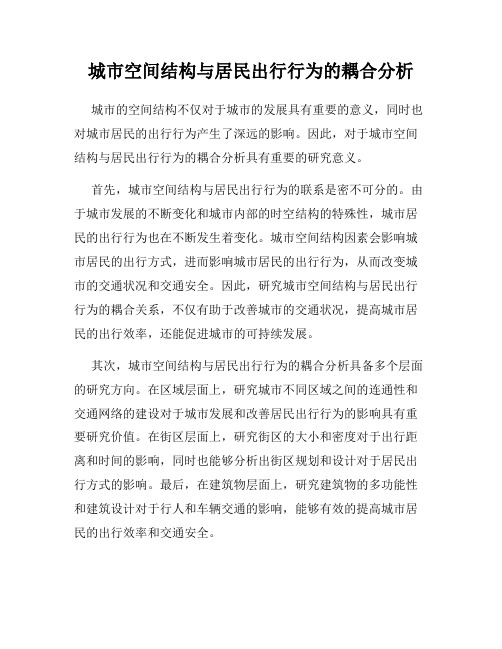
城市空间结构与居民出行行为的耦合分析城市的空间结构不仅对于城市的发展具有重要的意义,同时也对城市居民的出行行为产生了深远的影响。
因此,对于城市空间结构与居民出行行为的耦合分析具有重要的研究意义。
首先,城市空间结构与居民出行行为的联系是密不可分的。
由于城市发展的不断变化和城市内部的时空结构的特殊性,城市居民的出行行为也在不断发生着变化。
城市空间结构因素会影响城市居民的出行方式,进而影响城市居民的出行行为,从而改变城市的交通状况和交通安全。
因此,研究城市空间结构与居民出行行为的耦合关系,不仅有助于改善城市的交通状况,提高城市居民的出行效率,还能促进城市的可持续发展。
其次,城市空间结构与居民出行行为的耦合分析具备多个层面的研究方向。
在区域层面上,研究城市不同区域之间的连通性和交通网络的建设对于城市发展和改善居民出行行为的影响具有重要研究价值。
在街区层面上,研究街区的大小和密度对于出行距离和时间的影响,同时也能够分析出街区规划和设计对于居民出行方式的影响。
最后,在建筑物层面上,研究建筑物的多功能性和建筑设计对于行人和车辆交通的影响,能够有效的提高城市居民的出行效率和交通安全。
再次,城市空间结构与居民出行行为的耦合分析还需要借助一些科学的手段和方法。
以数据采集和分析技术为例,通过研究城市交通流量、交通路线和出行方式等因素,能够更加全面的分析城市空间结构与居民出行行为间的联系。
同时还可以通过交通模型和计算模拟技术的应用,对城市空间结构和居民出行行为关系进行深入的定量化分析。
最后,城市空间结构与居民出行行为的耦合分析在实践中也有着广泛的应用价值。
例如,在城市发展和改造规划中,可以引入城市空间结构与居民出行行为的耦合分析结果,通过规划的优化设计,实现城市交通问题的解决。
同时,对于交通规划和出行管理,也可以根据分析结果实现运行效率的提升和交通安全的保障。
总之,城市空间结构与居民出行行为的耦合分析具有重要的研究价值和实践意义。
川道城市出行特征分析——以西宁市为例
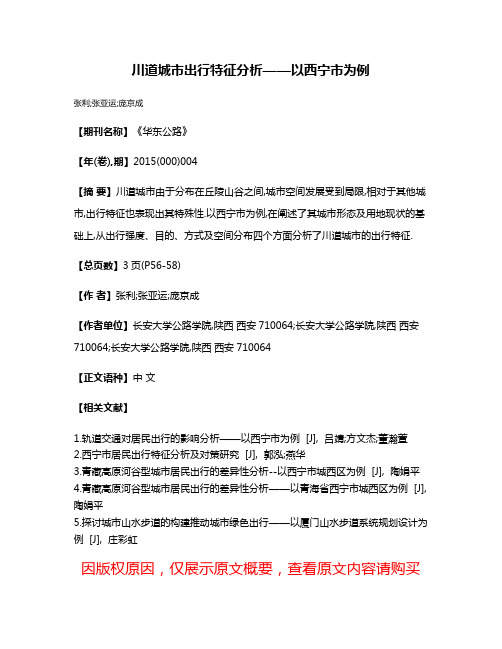
川道城市出行特征分析——以西宁市为例
张利;张亚运;庞京成
【期刊名称】《华东公路》
【年(卷),期】2015(000)004
【摘要】川道城市由于分布在丘陵山谷之间,城市空间发展受到局限,相对于其他城市,出行特征也表现出其特殊性.以西宁市为例,在阐述了其城市形态及用地现状的基础上,从出行强度、目的、方式及空间分布四个方面分析了川道城市的出行特征.【总页数】3页(P56-58)
【作者】张利;张亚运;庞京成
【作者单位】长安大学公路学院,陕西西安710064;长安大学公路学院,陕西西安710064;长安大学公路学院,陕西西安710064
【正文语种】中文
【相关文献】
1.轨道交通对居民出行的影响分析——以西宁市为例 [J], 吕靖;方文杰;董瀚萱
2.西宁市居民出行特征分析及对策研究 [J], 郭泓;燕华
3.青藏高原河谷型城市居民出行的差异性分析--以西宁市城西区为例 [J], 陶娟平
4.青藏高原河谷型城市居民出行的差异性分析——以青海省西宁市城西区为例 [J], 陶娟平
5.探讨城市山水步道的构建推动城市绿色出行——以厦门山水步道系统规划设计为例 [J], 庄彩虹
因版权原因,仅展示原文概要,查看原文内容请购买。
部分城市居民出行特征
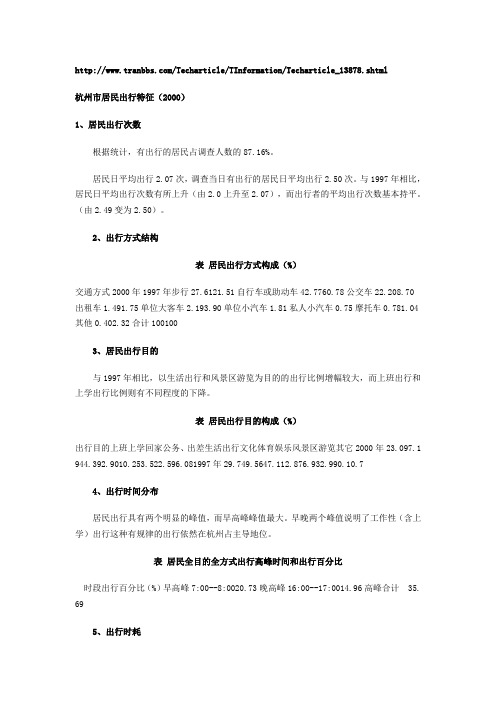
/Techarticle/TInformation/Techarticle_13878.shtml杭州市居民出行特征(2000)1、居民出行次数根据统计,有出行的居民占调查人数的87.16%。
居民日平均出行2.07次,调查当日有出行的居民日平均出行2.50次。
与1997年相比,居民日平均出行次数有所上升(由2.0上升至2.07),而出行者的平均出行次数基本持平。
(由2.49变为2.50)。
2、出行方式结构表居民出行方式构成(%)交通方式2000年1997年步行27.6121.51自行车或助动车42.7760.78公交车22.208.70出租车1.491.75单位大客车2.193.90单位小汽车1.81私人小汽车0.75摩托车0.781.04其他0.402.32合计1001003、居民出行目的与1997年相比,以生活出行和风景区游览为目的的出行比例增幅较大,而上班出行和上学出行比例则有不同程度的下降。
表居民出行目的构成(%)出行目的上班上学回家公务、出差生活出行文化体育娱乐风景区游览其它2000年23.097.1 944.392.9010.253.522.596.081997年29.749.5647.112.876.932.990.10.74、出行时间分布居民出行具有两个明显的峰值,而早高峰峰值最大。
早晚两个峰值说明了工作性(含上学)出行这种有规律的出行依然在杭州占主导地位。
表居民全目的全方式出行高峰时间和出行百分比时段出行百分比(%)早高峰7:00--8:0020.73晚高峰16:00--17:0014.96高峰合计35.695、出行时耗居民平均出行时耗为32.91分钟。
出行时耗在20分钟以内的占49.69%,出行时耗在4 0分钟以内的占80.48%,出行时耗超过60分钟的占6.89%。
表时耗分布表时耗(分)<56-1011-1516-2021-2526-3031-3536-4041-4546-5051-5556-6061-6566-70>70合计比例(%)6.3318.6711.8312.352.7520.721.715.282.013.100.446.950.361.106.39100珠海市居民出行特征(1998)居民平均出行次数1998年出行率为79%,有出行者人均出行次数为3.94次/人,居民出行次数为3.04次/人.日。
西安市居民出行特征变迁及城市发展对策
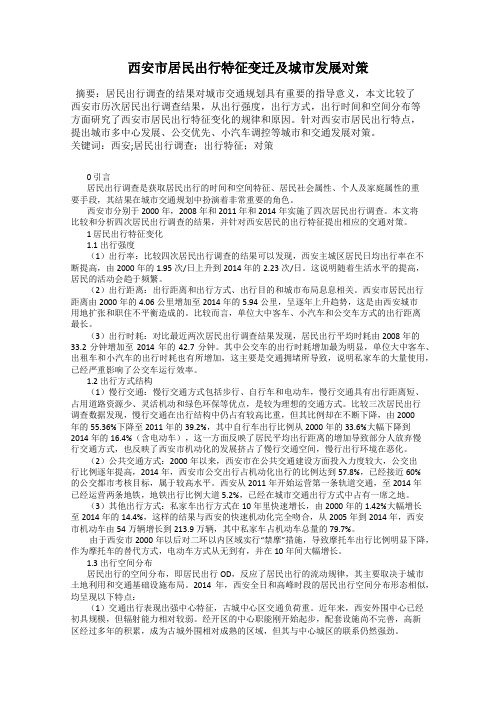
西安市居民出行特征变迁及城市发展对策摘要:居民出行调查的结果对城市交通规划具有重要的指导意义,本文比较了西安市历次居民出行调查结果,从出行强度,出行方式,出行时间和空间分布等方面研究了西安市居民出行特征变化的规律和原因。
针对西安市居民出行特点,提出城市多中心发展、公交优先、小汽车调控等城市和交通发展对策。
关键词:西安;居民出行调查;出行特征;对策0 引言居民出行调查是获取居民出行的时间和空间特征、居民社会属性、个人及家庭属性的重要手段,其结果在城市交通规划中扮演着非常重要的角色。
西安市分别于2000年,2008年和2011年和2014年实施了四次居民出行调查。
本文将比较和分析四次居民出行调查的结果,并针对西安居民的出行特征提出相应的交通对策。
1 居民出行特征变化1.1出行强度(1)出行率:比较四次居民出行调查的结果可以发现,西安主城区居民日均出行率在不断提高,由2000年的1.95次/日上升到2014年的2.23次/日。
这说明随着生活水平的提高,居民的活动会趋于频繁。
(2)出行距离:出行距离和出行方式、出行目的和城市布局息息相关。
西安市居民出行距离由2000年的4.06公里增加至2014年的5.94公里,呈逐年上升趋势,这是由西安城市用地扩张和职住不平衡造成的。
比较而言,单位大中客车、小汽车和公交车方式的出行距离最长。
(3)出行时耗:对比最近两次居民出行调查结果发现,居民出行平均时耗由2008年的33.2分钟增加至2014年的42.7分钟。
其中公交车的出行时耗增加最为明显,单位大中客车、出租车和小汽车的出行时耗也有所增加,这主要是交通拥堵所导致,说明私家车的大量使用,已经严重影响了公交车运行效率。
1.2出行方式结构(1)慢行交通:慢行交通方式包括步行、自行车和电动车,慢行交通具有出行距离短、占用道路资源少、灵活机动和绿色环保等优点,是较为理想的交通方式。
比较三次居民出行调查数据发现,慢行交通在出行结构中仍占有较高比重,但其比例却在不断下降,由2000年的55.36%下降至2011年的39.2%,其中自行车出行比例从2000年的33.6%大幅下降到2014年的16.4%(含电动车),这一方面反映了居民平均出行距离的增加导致部分人放弃慢行交通方式,也反映了西安市机动化的发展挤占了慢行交通空间,慢行出行环境在恶化。
044、大都市区交通出行特征与演变趋势研究——以合肥为例
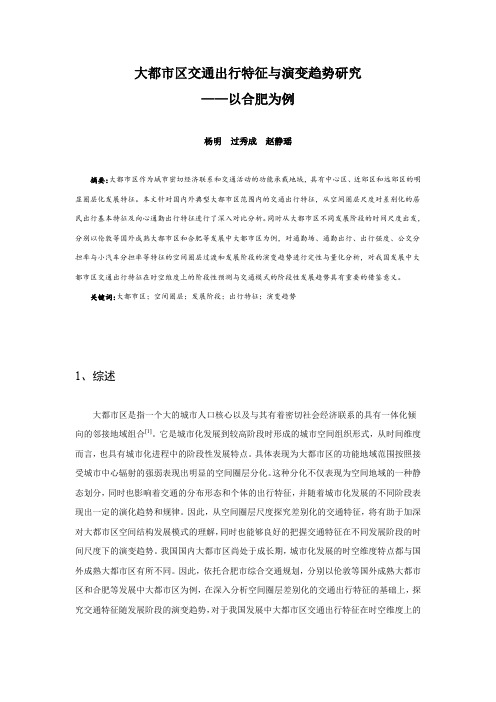
弹性出行比例随之上升。这主要是由于合肥大都市区中心辐射强度有限,外围圈层缺乏与中
心的干线交通支撑,外围片区组团发展较为独立,区内弹性出行较多导致的。同时也说明了
出行目的随空间圈层的过渡特征具有明显的阶段化特点。
表 1 伦敦、广州、合肥大都市区分圈层居民出行目的比例(%)
大都市 区
伦敦
空间尺度
中心城 近郊区 远郊区
图 6 大都市区公交分担比例分布曲线变化趋势图 图 7 大都市区小汽车分担比例分布曲线变化趋势图
3.2 向心通勤出行特征及演变趋势
3.2.1 通勤场总体分布
通勤场是由中心城向外辐射,对应于不同水平通勤率的等值线[8]。通勤场范围除了跟城 市的规模大小、用地布局有关外,还取决于城市的机动化水平以及交通设施发展状况。机动 化出行比例高,城市路网功能完善、结构合理,用于通勤出行的长距离、大运量轨道交通线 网完备,都将扩展城市通勤场范围。
30km 圈层
出行率(次/日) 3.04 2.79 2.02 2.36 2.06 2.71 2.68 2.80
合肥 20 公里圈层内居民出行强度基本接近国际成熟大都市区,随着城市化进程的发展, 中心城出行强度将保持一个较为平稳的水平。但 30 公里圈层外的近郊区和远郊区区居民出 行强度将有所下降,特别是远郊区。这主要是由于中心城的辐射能力随着城市化的发展有所 增强,同时交通联系也更为紧密,远郊区居民的通勤距离将有所增大,现状存在的出行午高 峰现象将逐渐减少,导致出行强度下降。
图 4 大都市区分圈层通勤出行目分布曲线变化趋势图
3.1.2 出行强度
成熟大都市区由于中心城内部弹性出行比例高于外围地区,其出行强度一般高于外围郊 区。以东京为例,其中心城范围全方式出行率 2.79 次/日,高于外围郊区 2.02 次/日;伦敦 大都市区居民出行率圈层分布特征也与东京类似。国内较成熟大都市区城市居民出行强度的 圈层差别化特征与东京、伦敦基本一致。以上海为例[7],由中心区向外围,人均出行率下降 趋势明显。而合肥大都市区的空间圈层发展主要集中在 20km 以内,在这一范围内同样存在 着出行强度随空间圈层外移而下降的趋势。然而在 30km 圈层,出行强度反而有所上升,这
- 1、下载文档前请自行甄别文档内容的完整性,平台不提供额外的编辑、内容补充、找答案等附加服务。
- 2、"仅部分预览"的文档,不可在线预览部分如存在完整性等问题,可反馈申请退款(可完整预览的文档不适用该条件!)。
- 3、如文档侵犯您的权益,请联系客服反馈,我们会尽快为您处理(人工客服工作时间:9:00-18:30)。
汇编目录第一编1.Ewing,R.,and Cervero,R.(2010).Travel and the built environment:a meta-analysis.Journal of the American Planning Association,76(3),265-294.2.Ewing,R.,and Cervero,R.(2001).Travel and the built environment:a synthesis.Transportation Research Record:Journal of the Transportation Research Board, 1780(1),87-114.3.Cervero,R.,and Kockelman,K.(1997).Travel demand and the3Ds:density,diversity,and design.Transportation Research Part D:Transport and Environment,2(3), 199-219.4.Cervero,R.,and Duncan,M.(2006).'Which Reduces Vehicle Travel More:Jobs-Housing Balance or Retail-Housing Mixing?.Journal of the American Planning Association,72(4),475-490.5.Cervero,R.,and Wu,K.L.(1998).Sub-centring and commuting:evidence from theSan Francisco Bay area,1980-90.Urban studies,35(7),1059-1076.6.Krizek,K.J.(2003).Residential relocation and changes in urban travel:doesneighborhood-scale urban form matter?.Journal of the American Planning Association,69(3),265-281.7.Handy,S.L.,Boarnet,M.G.,Ewing,R.,and Killingsworth,R.E.(2002).How the builtenvironment affects physical activity:views from urban planning.American journal of preventive medicine,23(2),64-73.8.Handy,S.,Cao,X.,and Mokhtarian,P.(2005).Correlation or causality between thebuilt environment and travel behavior?Evidence from Northern California.Transportation Research Part D:Transport and Environment,10(6),427-444.9.Handy,S.L.,and Clifton,K.J.(2001).Local shopping as a strategy for reducingautomobile travel.Transportation,28(4),317-346.10.Zhang,L.,Hong,J.H.,Nasri,A.,and Shen,Q.(2012).How built environment affectstravel behavior:A comparative analysis of the connections between land use and vehicle miles traveled in US cities.Journal of Transport and Land Use,5(3),40-52. 11.Saelens,B.E.,Sallis,J.F.,and Frank,L.D.(2003).Environmental correlates of walkingand cycling:findings from the transportation,urban design,and planning literatures.Annals of behavioral medicine,25(2),80-91.12.Limtanakool,N.,Dijst,M.,and Schwanen,T.(2006).The influence of socioeconomiccharacteristics,land use and travel time considerations on mode choice for medium-and longer-distance trips.Journal of transport geography,14(5),327-341.13.Chen,Y.P.,Song,Y.,Zhang,Y.,PENG,K.,Zhang,Q.,and Jin,X.(2011).Impact of landuse development on travel mode choice:a case study in shenzhen.Urban Transport of China,9(5),80-85.陈燕萍,宋彦,张毅,等.城市土地利用特征对居民出行方式的影响——以深圳市为例[J].城市交通,2011,9(5):80-85.14.Cervero,R.(1989).Jobs-housing balancing and regional mobility.Journal of theAmerican Planning Association,55(2),136-150.15.Transit and Urban Form.Volume1.PART I Transit,Urban Form,and the BuiltEnvironment:A Summary of Knowledge.第二编1.Chatman,D.G.(2013).Does TOD need the T?On the importance of factors otherthan rail access.Journal of the American Planning Association,79(1),17-31.2.Song,Y.,and Knaap,G.J.(2004).Measuring urban form:is Portland winning the waron sprawl?.Journal of the American Planning Association,70(2),210-225.3.Ewing,R.(1997).Is Los Angeles-style sprawl desirable?.Journal of the Americanplanning association,63(1),107-126.4.Cervero,R.,and Murakami,J.(2010).Effects of built environments on vehicle milestraveled:evidence from370US urbanized areas.Environment and Planning A,42(2), 400-418.5.Badland,H.,and Schofield,G.(2005).Transport,urban design,and physical activity:an evidence-based update.Transportation Research Part D:Transport and Environment,10(3),177-196.6.Lin,J.J.,and Yang,A.T.(2009).Structural analysis of how urban form impacts traveldemand:Evidence from Taipei.Urban Studies,46(9),1951-1967.7.Zhao,P.(2011).Car use,commuting and urban form in a rapidly growing city:evidence from Beijing.Transportation planning and technology,34(6),509-527.8.Zhao,P.,Lü,B.,and de Roo,G.(2010).Urban expansion and transportation:theimpact of urban form on commuting patterns on the city fringe of Beijing.Environment and planning.A,42(10),2467-2486.9.Yang,J.,Shen,Q.,Shen,J.,and He,C.(2012).Transport impacts of clustereddevelopment in Beijing:Compact development versus overconcentration.Urban Studies,49(6),1315-1331.10.Ma,K.R.,and Banister, D.(2007).Urban spatial change and excesscommuting.Environment and Planning A,39(3),630-646.11.Horner,M.W.(2007).A multi-scale analysis of urban form and commuting change ina small metropolitan area(1990–2000).The Annals of Regional Science,41(2),315-332.12.Shen,Q.(1998).Location characteristics of inner-city neighborhoods andemployment accessibility of low-wage workers.Environment and planning B: Planning and Design,25(3),345-365.沈青,张岩,张峰.内城区的区位特征与低收入者的就业可达性[J].国际城市规划, 2007,22(2):26-35.13.Levine,J.,Grengs,J.,Shen,Q.,and Shen,Q.(2012).Does Accessibility Require Densityor Speed?A Comparison of Fast Versus Close in Getting Where You Want to Go in US Metropolitan Regions.Journal of the American Planning Association,78(2),157-172.14.Shen,Q.(2000).Spatial and social dimensions of commuting.Journal of theAmerican Planning Association,66(1),68-82.15.Sanchez,T.W.(1999).The connection between public transit and employment:thecases of Portland and Atlanta.Journal of the American Planning Association,65(3), 284-296.16.Kawabata,M.,and Shen,Q.(2007).Commuting inequality between cars and publictransit:The case of the San Francisco Bay Area,1990-2000.Urban Studies,44(9), 1759-1780.17.Yang,J.(2005).Commuting impacts of spatial decentralization:A comparison ofAtlanta and Boston.Journal of Regional Analysis and Policy,35(1),69-78.18.Zhou J.,Chen X.,and Huang W.(2013).Jobs-housing balance and commute efficiencyin cities of central and western China:a case study of Xi’an.Journal of Geographical Science,68(10),1316-1330.19.Zhou,J.,Wang,Y.,and Schweitzer,L.(2012).Jobs/housing balance andemployer-based travel demand management program returns to scale:Evidence from Los Angeles.Transport Policy,20,22-35.周江评,陈晓键,黄伟,等.中国中西部大城市的职住平衡与通勤效率——以西安为例[J].地理学报,2013,68(010):1316-1330.20.Zhao H.,Yang K.,Wei H.,and Zhao W.(2013).Job-housing space restructuring andevolution of commuting patterns in Beijing metropolian area.City Planning Review, 37(8),33-39.赵晖,杨开忠,魏海涛,等.北京城市职住空间重构及其通勤模式演化研究[J].城市规划,2013,37(8):33-39.第三编1.Boarnet,M.G.(2011).A broader context for land use and travel behavior,and aresearch agenda.Journal of the American Planning Association,77(3),197-213.2.Crane,R.(2000).The influence of urban form on travel:an interpretivereview.Journal of Planning Literature,15(1),3-23.3.Boarnet,M.G.,and Sarmiento,S.(1998).Can land-use policy really affect travelbehaviour?A study of the link between non-work travel and land-use characteristics.Urban Studies,35(7),1155-1169.4.Pan,H.,Shen,Q.,and Zhang,M.(2009).Influence of urban form on travel behaviourin four neighbourhoods of Shanghai.Urban Studies,46(2),275-294.潘海啸,沈青,张明.城市形态对居民出行的影响——上海实例研究[J].城市交通, 2009,7(6):28-32.5.Zhao,P.(2014).The impact of the built environment on bicycle commuting:Evidence from Beijing.Urban studies,51(5),1019-1037.6.Joh,K.,Nguyen,M.T.,and Boarnet,M.G.(2012).Can built and social environmentalfactors encourage walking among individuals with negative walking attitudes?.Journal of Planning Education and Research,32(2),219-236.7.Chatman,D.G.(2009).Residential choice,the built environment,and nonwork travel:evidence using new data and methods.Environment and planning.A,41(5), 1072-1089.8.Dieleman, F.M.,Dijst,M.,and Burghouwt,G.(2002).Urban form and travelbehaviour:micro-level household attributes and residential context.Urban Studies, 39(3),507-527.9.Joh,K.,Boarnet,M.G.,Nguyen,M.T.,Fulton,W.,Siembab,W.,and Weaver,S.(2008).Accessibility,travel behavior,and new urbanism:case study of mixed-use centers and auto-oriented corridors in the South Bay Region of Los Angeles,California.Transportation Research Record:Journal of the Transportation Research Board, 2082(1),81-89.10.Zolnik,E.J.(2011).The effect of sprawl on private-vehicle commuting outcomes.Environment and Planning-Part A,43(8),1875-1893.11.Meurs,H.,and Haaijer,R.(2001).Spatial structure and mobility.TransportationResearch Part D:Transport and Environment,6(6),429-446.。
